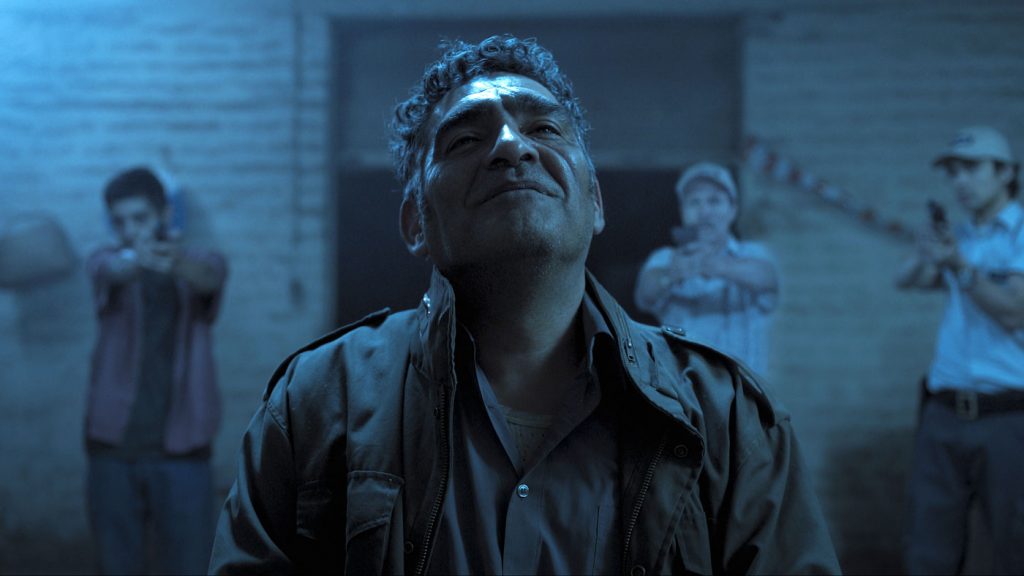Chile | 2017 | directed by Lucio A. Rojas
Logline: Four young women arrive at a rural retreat, but are attacked by an older man and his adult son, leaving the women fighting for survival.
Part of a new wave of brutalism out of Latin America, this has the spine of a rape-revenge flick, wearing the torn and tattered clothes of political contempt, and is definitely the most savage and unrelenting horror movie I’ve witnessed since A Serbian Film (2010). Indeed Rojas has delivered a pulverising study of inhumanity, and it will likely shock the most jaded horrorphile. Trauma is exactly what it says it is.
The movie opens in the dungeons of Chile, 1978, a country under the despotic rule of dictator Pinochet, who had endless atrocities committed by his military regime, killing thousands. A badly beaten woman prisoner is trussed up, with her legs spread. A high-ranking officer, aided by soldiers, injects her teenage son with some kind of potent steroid, and forces him to rape her, slices the boy’s face open with a knife, and then shoots his mother through the head at point blank range. The boy, trapped like a lab rat, vomits over his mother, unable to stop.
Cut to 2011, slam bam into the middle of a graphic sex scene between Camila (Macarena Carerre) and her girlfriend, Julia (Ximena del Solar). The contrast is so extreme, so sensational, it’s unintentionally absurd. From rape and cruelty to making love and tenderness. Okay, Rojas isn’t interested in subtly, even if he is making a movie with a political sub-text. He doesn’t beat around the bush (in fact, there’s no bush here at all, it’s South America, not even landing strips in this jungle hell, but I digress, sorry, tasteless humour in an attempt to lighten the mood)
Camila and Julia hook up Andrea (Catalina Martin), and Camila’s cousin Magdalena (Dominga Bofill). The four women pile into a small car and head out into the countryside to a family homestead outside of Santiago for a little rest and recreation. But they end up stopping at a dingy bar for directions, and are harassed by the local barflies. Juan (Daniel Antivilo) steps in and allows the women to leave the premises safely.
At the cottage the women unwind, but they are being watched. The two peeping toms enter the home. It is Juan, and his simple-minded son Mario (Felipe Rios). The two men have very bad things in mind. It’s not long before the women are pulled down into absolute hell.
For the second half of the movie the women must fight to survive. It’s a living nightmare. After a return to the bar where two policeman attempt to rescue the women, and fail badly, the group end up in a derelict warehouse where they must attempt to outwit Juan and Mario who have been living as monsters.
Indeed Trauma is a movie about monsters, human monsters, and the poor, poor victims of atrocity. Rojas doesn’t just slap his audience in the face, he king hits them with a clenched fist. With high production values and solid performances from the cast, especially the brave female actors, Trauma bears much similarity to A Serbian Film, not just in the technical departments, as the special effects are very impressive too, but also in the angry political perspective, though it’s hard to make the sub-textual connections when you are being sledgehammered with such atrocity ferocity (sorry, couldn’t resist that one).
Trauma is not an easy one to recommend. For the horrorphiles, yes, but for most everyone else, I would probably say, take proper heed, you will not come out the other side unscathed, for it is horrendously icky and ultra-violent. Even I felt like taking a long sudsy bath after watching it, and I am a seasoned, hardened horrorphile. That said, ultimately Trauma provides a modicum of light at the end, unlike the truly tenebrous denouement of A Serbian Film.
Trauma. It’s a very, very dark journey. Consider yourself warned.



